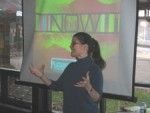Summit Brings Student Activists Together

On Friday, November 10 and Saturday, November 11, approximately 20 Colgate students representing a litany of civic-minded groups gathered at the African, Latin, Asian and Native American (ALANA) Cultural Center for the summit, a workshop designed to give leaders in the student activism community new ideas and perspective.
“The idea for the conference came when we were brainstorming where to go after Genocide Awareness Month and we figured it would be good to get some basic activism skills,” co-organizer junior Kelly Gartside said.
Co-organizer junior Liz Whitehurst gave a similar explanation.
“After Genocide Awareness Month, we felt we had exhausted our resources [at Colgate] to improve our skills,” Whitehurst said. “We wanted a fresh skill set.”
With the support of George R. and Myra T. Cooley Professor of Peace & Conflict Studies and Professor of Art & Art History Daniel Monk, Gartside and Whitehurst arranged for activism experts Noelle Damico and Marc Rodrigues to spend two days sharing their experiences and helping Colgate students apply these lessons to projects at Colgate.
Damico, an ordained Presbyterian minister with extensive social action experience from grassroots efforts to Capitol Hill lobbying, is the Associate for Fair Food of the Presbyterian Church USA. She led much of the conference, facilitating discussions as well as sharing her experiences with various economic rights organizations, including the Student Farmworker Alliance (SFA) and the Coalition of Immokalee Workers.
Rodrigues is a national representative for the SFA, which, according to the group’s summary statement, “is a national network of students and youth organizing in solidarity with farmworkers to eliminate sweatshop conditions on modern-day slavery in the fields.”
Rodrigues’s experience with the hugely successful “Boot the Bell” boycott of Taco Bell outlets on major college campuses across the country provided a model of student activism and a point of comparison for Colgate students to evaluate their projects.
The two-day program was loosely divided into a series of discussion sessions designed to focus participants’ thinking on student organizing as it exists at Colgate.
After introductions on Friday afternoon, the group split into small working groups to brainstorm a framework of issues for the rest of the conference. Students’ organizing successes, barriers, possible avenues for improvement and general comments were written on large poster paper and posted around the room. These responses were then used as the basis for a 90-minute breakout session to generate discussion and give Rodrigues and Damico a better sense of what issues specific to Colgate they could address.
Dinner on Friday allowed for another hour of informal discussion and idea sharing.
Saturday’s schedule turned each of the previous day’s brainstorming topics into a discussion session, with Damico and Rodrigues providing advice and suggestions to the participants, as well as helping guide discussion on moving forward from the status quo. The logistics of the “Boot the Bell” campaign were explored, again as a model for Colgate projects to come.
Of the many points that came up over the two days, issues of motivating the student body, developing leaders and communication seemed most prominent. Motivation or apathy of the student body was a particularly contentious point, with as many diverging opinions being offered as there were conference participants.
“It seems to me that everybody at Colgate is dedicated to their issue, but apathetic towards issues that they’re not personally involved with,” said senior Dan Prial. Many others agreed.
Damico acknowledged this problem as well.
“It’s helpful to find an issue that students can locate themselves,” she said. “Ask, ‘How does this affect me?'”
“The more you open up topics like poverty and genocide, the more you find out about others’ passions,” Rodrigues offered.
Each issue raised was worked through in a similar manner, a style that seemed to maximize the cross-group discussion and thinking possibilities.
“When you’re talking about organizing, it always depends on changing context…you never know quite what will happen,” Damico said of workshops in this style. “I do this a lot…the context isn’t brought by me; I’m just the facilitator.”
In this light, the main success of the Colgate Summit for Action was likely the very opportunity for activism groups to exchange ideas with peers.
“We’re always trying to get people to meet each other outside of our specific group ‘families,'” Whitehurst said.



